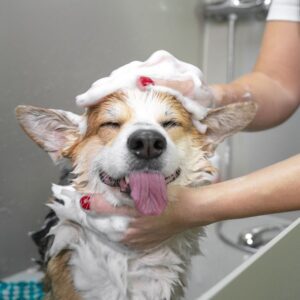Puppy farms or mills are a form of unregulated operation, which means that the dogs that come from them aren’t subjected to the same standards and regulations most breeders require.
Puppy mills have become so widespread that many people don’t realize they support this illegal practice when they buy from a pet store or breeder.
This can be dangerous because it increases the likelihood of adopting an unhealthy dog into your home.
The breeders won’t show you the parents of the puppies. Additionally, the puppies won’t be clean and healthy.
The breeders would breed multiple breeds, as usually, any breeder breeds 1 type of dog. But in a puppy farm, there would be multiple breeds available.
The traits of the puppies might be different than the pure breeds as they aren’t primarily purebred.
We will explain everything related to a puppy farm and whether you can buy a dog from a puppy farm or not. We will also give you tips on how to spot a puppy farm. Keep reading!
What is a Puppy Farm, and how to Spot One?

A puppy farm is a commercial dog breeding facility. It’s usually located in rundown buildings, and the puppies often have health issues, including diseases like mange and distemper.
The puppies are kept in cages that are too small to move around comfortably, so they struggle to eat or sleep as well as they would if they were let out in their yard with grass to run on.
The puppies are often sold through newspaper ads and websites, making them less expensive than you might think.
But the price usually needs to be more accurate because it doesn’t include the cost of vaccinations and vet bills needed to get the puppy healthy again.
The puppies are also often sold with false promises. Some breeders will tell you they’re selling purebred or designer dogs and even provide a certificate of authenticity. Still the puppy is mixed breed.
The breeders won’t show you the parents of the puppies. Additionally, the puppies won’t be clean and healthy.
The breeders would breed multiple breeds, as usually, any breeder breeds 1 type of dog. But in a puppy farm, there would be multiple breeds available.
The traits of the puppies might be different than the pure breeds as they aren’t primarily purebred.
The Dangers of Buying From a Puppy Farm:

If you’re considering getting a dog from a puppy farm, think again. Puppy farms are cruel and dangerous, hurting not only the dogs but also the public.
A puppy farm is any facility where dogs are raised under unsanitary conditions to produce puppies for sale to pet stores or other outlets.
These facilities don’t care for these animals’ welfare since they will not properly care for the pets. Thus, this will make the dogs become weak and diseased easily when left alone without proper supervision.
The conditions at these facilities are highly unsanitary because there are no standards set up by law (such as health inspections) to ensure that each animal has enough food throughout its lifetime.
They don’t care about the growth and personality of their dog. They want to sell their dog in no time!
This is one of the biggest reasons puppy mills are so bad for dogs. Because these facilities don’t care about their animals, they treat them as commodities, not living creatures.
They don’t consider that each dog has its personality, needs, wants, and desires.
Finding a Reputable Breeder: Tips for Avoiding Puppy Mills

The first step when looking for a puppy is to find out if the breeder is reputable. Here are some tips on how to do so:
- Ask for a copy of their parent’s pedigree and vaccination records. If they can’t provide these documents, it may be because there are no records or because they’re hiding something—in either case, don’t buy from them!
- Look at where they keep their dogs and ask yourself whether this place meets your standards for an animal shelter or rescue organization (or whatever other kind of facility you prefer).
Ensure that any kennel facilities are clean and comfortable; if not, find another place with better conditions for your new addition.
- Ask to see the dogs. If they’re shy or not friendly, it may be because they’ve been mistreated and need time to adjust to new people or situations.
Ask if you can take them for a walk or play with them at their facility; if they only let you pet the dogs through bars, it probably could be a better sign.
- Ask about the dogs’ medical history and if they’ve been spayed or neutered.
If not, ask why; if it’s because the shelter is too full to accommodate surgery or because it costs money, these are both valid reasons but should be disclosed upfront.
- If you’re looking for a dog already trained, ask about the shelter’s training program and whether the dogs are already trained.
- Ask if the dog has been temperament tested, which means it has passed an evaluation process designed to ensure it will get along with other animals and people.
- The shelter should also be able to tell you how long the dog has been in its care and whether it’s a stray or owner surrender.
If the dog is an owner surrender, ask how many times the dog has been returned; if it’s more than once, this could mean that the owner was unable to properly care for it and doesn’t want to take responsibility anymore.
A good breeder should be able to answer all the above questions and more with ease.
If the breeder cannot provide you with any information about the puppy’s parents or show your health clearances for both its parents (if possible), then this could be a sign that there is something wrong with the litter.
What are the Consequences of Supporting a Puppy Farm Operation?

It’s a popular myth that buying from a puppy farm is okay because these dogs are treated well and have good homes.
The opposite is true: these dogs are not well cared for, and many suffer abuse from their owners.
Puppy farmers are often driven by profit rather than the well-being of their animals. They may need to be appropriately trained or licensed and provide their dogs with adequate care and nutrition.
Puppy farms can also pose a health risk to humans because they often do not vaccinate puppies against common diseases such as parvovirus and distemper.
Puppies from puppy farms often kept in poor conditions and lacking proper socialization or vaccinations may have health problems later in life.
Puppies born in puppy farms may also be taken away from their mothers too early, leading to behavioral issues. You are indirectly contributing by supporting a puppy farm operation and its inherent mistreatment of animals.
Puppy farms raise and sell large numbers of dogs without considering whether there will be a market for them. This can contribute to overpopulation, which in turn leads to euthanasia as well as suffering by both humans and animals.
Puppy farms may also violate local and state regulations, making it hard to determine whether you are buying a healthy dog.
Final Thoughts?
It should be clear that puppy farms are a severe problem that needs to be addressed by everyone.
If you’re thinking of buying a pet, or have already purchased one from a pet store or breeder, ask yourself these questions: Are they cruel? Are they inhumane? Do they abuse their animals?
If the answer is yes to any of these questions, think again. You don’t want any part of this!
If you have a puppy or are considering getting one, ensure your pet comes from a reputable source.
If you need help determining where your puppy came from, ask the breeder for a copy of their license and proof that they complied with local laws.
You can also contact your local humane society or animal control agency to find out if there are any complaints against the breeder.




